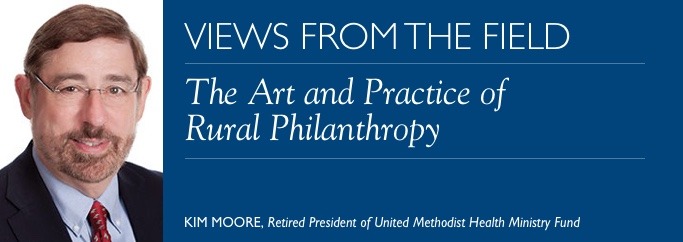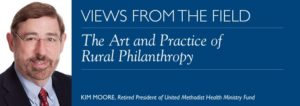
Kim Moore, Retired President, United Methodist Health Ministry Fund
Rural America contains at least 90 percent of the nation’s territory and about 20 percent of its population, yet only seven percent of private philanthropic dollars find their way to these regions (USDA 2015). Newly formed conversion foundations and community foundations, often with rural areas in their grantmaking territories, have identified the absence of significant regional and national philanthropic attention to rural America. One result is that millions of rural Americans lack sufficient resources to address challenges facing their communities. These challenges include extreme poverty and many well-known health disparities.
This situation motivated Campbell University’s Office of Rural Philanthropic Analysis (ORPA) to identify and encourage good philanthropic practice in rural America. Visits in 2018 to Washington State, New Mexico, Iowa, Maine, and New Hampshire exposed a team from ORPA to the frontlines of rural grantmaking. The ORPA team—of which I was a member—learned that several grantmakers are successfully engaging with their rural communities and achieving impressive outcomes. More widespread awareness of these rural accomplishments will hopefully attract additional funders to invest in rural communities.
Getting Rural People on Board
The funders we visited do not view the challenges of rural work as discouraging. They see rural areas, like other potential fields of work, in terms of their unique sets of strengths, limitations, barriers, and opportunities. Entering rural work often starts with intentional inclusion of people from rural areas on boards and committees. For example, Empire Health Foundation in eastern Washington state allocates board slots for rural residents, including Native Americans living on three reservations. Other funders use staff to create internal rural knowledge and capacity to develop rural relationships. The Community Foundation of Greater Dubuque in Iowa has staff dedicated to each of the six counties outside Dubuque proper. The funders visited through ORPA were in agreement that having experienced rural voices inside their organizations is critical to their rural efforts.
Reaching Rural Communities
Door-opening communication with rural communities can be challenging due to distance, unfamiliarity of many rural communities with private philanthropy, and limited staff in many rural communities to work on new funding. Con Alma Health Foundation in New Mexico utilizes a Community Advisory Committee with members dispersed statewide to engage community members about community needs and potential grant work. Sometimes rural engagement comes from simply not overlooking rural areas in planning and implementation. Endowment for Health in New Hampshire has a field-building approach for work in early childhood, healthy aging, and children’s behavioral health. Its learning communities function statewide using technology for some meetings, widespread distribution of tool kits, and relationships with statewide associations that amplify rural voices. Rural grantees throughout the country frequently mention personal invitations to foundation learning events as creating first associations with out-of-area funders.
Adapting to Rural Circumstances
Successful rural work requires flexibility. Items frequently needed in rural program budgets such as increased transportation expenses, varied and part-time professionals, and unusual facility arrangements may not fit foundations’ line item rules. Successful models from urban or suburban sites may require practical modifications. Foundations have to decipher, with the advice of rural leaders, which elements of models are critical for results and how those can be provided in environments with different human and capital resources. Maine Health Access Foundation found that rural communities planning work for health equity achieved more when workplans were readily and easily changed, and the foundation moved to annual workplans for these community coalitions instead of its original three-year approach.
Building Trusting Relationships
Flexibility works best when strong, trusted relationships are established between funders and communities. Some strategies for relationship building include:
- including and providing financial support for community representatives on foundation boards and advisory groups;
- encouraging and supporting rural residents to participate in regional and statewide groups;
- developing longer-term commitments to relationships;
- being present for key community events;
- aligning with natural connectors (those persons who look externally for ideas and resources and have standing—not necessarily position—to facilitate change); and
- providing funds for community-identified issues versus foundation strategic imperatives, especially as work begins.
Impact
Funders working in rural areas report that they often see impact beyond the dollars. Rural areas with limited resources can stretch dollars, and grants frequently get wider attention in rural areas, creating broader community participation in projects. In rural Iowa, small grants supporting an adult English as a Second Language program mushroomed into tangible expressions of greater community awareness, inclusion, and understanding of a significant, previously isolated immigrant community. Grants supporting a library in rural New Mexico created an operational base for key community connectors and assisted in expanded school programming, a community-run grocery store, child care services, and advocacy for increased support statewide for rural libraries. Grants that supported an investigation of food insecurity in rural Maine produced changes in the operation of the local food bank and wider replication of food support programs.
Funders advising on the OPRA project believe it is possible that some of the under-investment by private philanthropy in rural areas is based on a mistaken belief that rural projects will not perform well, or that smaller numbers will limit impact. If this is the case, there are local and regional funders who have mastered the art and practice of rural philanthropy, will confirm its rewards, and can be strong partners and coaches for other funders looking at rural regions for investment.
Side Bar
Campbell University’s Office of Rural Philanthropic Analysis (ORPA) was an effort during 2017-2019 to understand funding practices leading the way toward health improvement in rural regions. Allen Smart served as ORPA’s Director and was supported in part by Robert Wood Johnson Foundation. ORPA sponsored four sites visits by a team which included Betsey Russell, Word Play LLC; Shawn Poynter, Shawn Poynter Photography; and Kim Moore, retired President of United Methodist Health Ministry Fund. Regions visited and principal hosts were: Eastern Washington-Empire Health Foundation; Maine and New Hampshire-Maine Health Access Foundation and Endowment for Health; Northeast Iowa—Greater Dubuque Community Foundation; and New Mexico-Con Alma Health Foundation.
References
“USDA Study: Rural Philanthropy Still an Underfunded Afterthought,” Rick Cohen, Nonprofit Quarterly, July 9, 2015.

